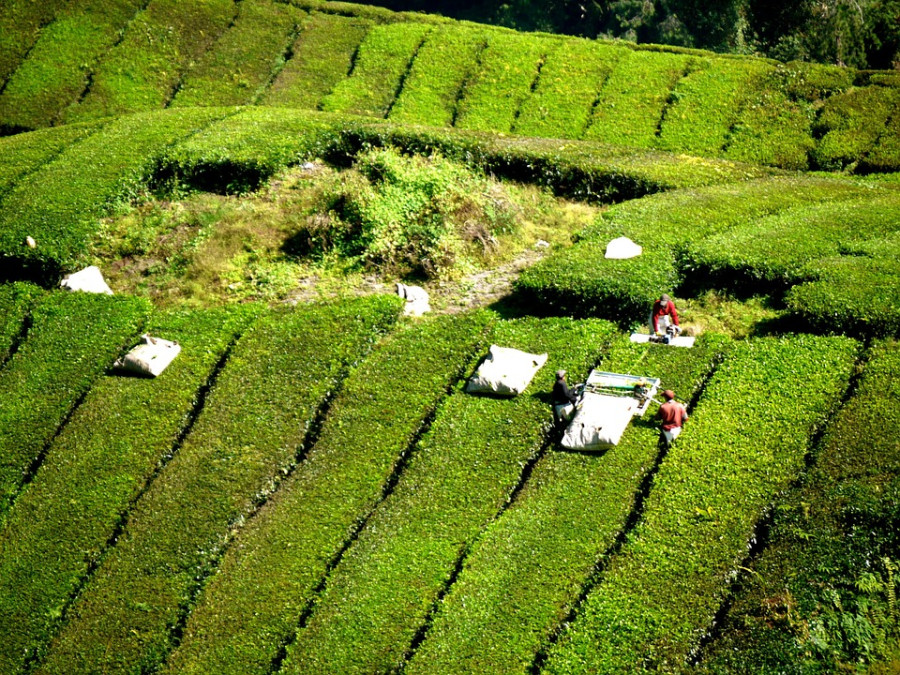Opinion
Exploitation in the hills
Beyond the commercial price of every packet of tea manufactured in Nepal is the hidden price of human lives degraded by labour exploitation. Workers are forced to work in poor and inhumane environments with wages, services and facilities far below the minimum set by the laws of Nepal.
Anurag Devkota
The hills of eastern Nepal yield one of the best teas in the world. The old adage that the best things in the world always come with a price holds widely true in Nepal’s tea industry. Beyond the commercial price of every packet of tea manufactured in Nepal is the hidden price of human lives degraded by labour exploitation. Workers are forced to work in poor and inhumane environments with wages, services and facilities far below the minimum set by the laws of Nepal.
Despite recent labour laws affording them a range of protections, facilities and services, the workers in tea estates remain subject to absolute exclusion. They are constrained by their companies in such a way that they are forced to forgo their lawful rights and protection for a meagre life that is exceedingly difficult to sustain.
The plight
Nepali tea estate workers have been constantly cheated, not just by their companies, but also by their own government. The government has been addressing the plight of tea estate workers legislatively by enacting and implementing separate labour regulations and establishing a separate minimum wage rate. However, this minimum wage rate (Rs231 per day) that is prescribed for tea estate workers is less than half of that fixed for other workers (Rs517 per day).
According to a tea estate worker from Ilam, this daily wage of Rs231 is not enough to sustain a healthy and fulfilled daily life. Workers are unable to realise basic rights like education for their children and adequate shelter because they are unable to afford them. They are further deprived of basic health facilities at their workplace, and there were situations when workers injured at the workplace did not receive adequate treatment or compensation.
One can see in the case of tea estate workers a glaring contradiction set by the Nepal government, wherein labourers are guaranteed rights but not guaranteed adequate financial means to realise them.
In general, tea estate workers are provided housing on the premises in return for their service. After working for three consecutive years, workers are provided a house on the grounds of the estate. However, these houses often have no electricity or running water, at least in the government-owned tea estates in Ilam. Workers who are granted houses with access to electricity or drinking water often have to pay for these utilities. Workers are then required to give back their homes to their companies when they retire. Though they have no home to which they can return after reaching retirement age, their retirement fund is not sufficient to fund the purchase of a new home.
For example, after spending their entire life working in the tea garden for their wealthy employers, the workers at one of the government-owned tea estates in Ilam receive a retirement sum of only Rs20,000. An individual can neither build a home nor secure any rental property with this amount. In order to retain their house, retired workers are compelled to send their children to work for the same tea factories from which they just retired. Ultimately, this vicious cycle is perpetuated by the insufficient regulations imposed under the labour laws that were devised with the purported intention of protecting these tea estate workers.
Subjected to this cycle, generations of workers spend their lives within the tea estate. They live and die in the tea estate, but the compensation they receive from their employers is not proportionate to the value of the blood, sweat and tears they have put into their work. These workers are not in a position to advocate for themselves and bargain with their company or the government for fair pay for fear of losing their only source of income. Trade unions have taken an active role in fighting against the factory owners and the government of Nepal on behalf of all workers. These unions are not demanding something that is beyond the realistic capacity of the government. They are simply and justifiably calling for effective implementation of the existing labour laws and substantive intervention against the current profession-based discriminatory policies.
Time to reflect
These tea estate workers are of the view that if the government does not overlook their situation and promotes tea estates with fairer financial schemes, it could generate a range of mutually beneficial employment opportunities in Nepal. On the contrary, the government has been busy celebrating its nominal successes and inaugurating new empty schemes like the Prime Minister Employment Programme and contribution-based social security schemes. Despite these seeming successes, more than 45,000 tea estate workers are beyond the range of protection, and are forced to go abroad due to the absence of adequate financial security in their own country.
The government’s strategy to call Nepali migrant workers to return and work in their home country is theoretically a good idea, but it is neither viable nor sustainable practically. The government should introduce more strategic and sustainable solutions instead of making popular decisions. Law and policymakers should place a priority on institutionalising financial security and favourable working conditions for labourers so that they can live in an environment that enables them to fully realise their social rights.
In the microcosm of Nepal’s thriving tea industry, the price tag of a product enjoyed by all of society is not always reflective of the sacrifices made by some of its citizens. Government officials would do well to reflect on this as they enjoy their next cup of Nepal’s finest tea.
Devkota is a human rights lawyer.




 13.03°C Kathmandu
13.03°C Kathmandu










